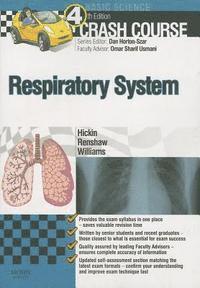
- Format
- Häftad (Paperback)
- Språk
- Engelska
- Antal sidor
- 264
- Utgivningsdatum
- 2013-08-14
- Upplaga
- 4
- Medarbetare
- Renshaw, James / Chapman, Rachel / Horton-Szar, Daniel
- Illustrationer
- Approx. 172 illustrations
- Dimensioner
- 247 x 177 x 12 mm
- Vikt
- Antal komponenter
- 1
- ISBN
- 9780723436270
- 521 g
Crash Course Respiratory System
- Skickas från oss inom 5-8 vardagar.
- Fri frakt över 249 kr för privatkunder i Sverige.
Passar bra ihop
De som köpt den här boken har ofta också köpt Why Vegans Have Smaller Brains av David Ellis, Alison Morgan, Anita Tagore (inbunden).
Köp båda 2 för 665 krKundrecensioner
Recensioner i media
I think this edition of the book covers the curriculum for respiratory physiology and medicine at an undergraduate level quite adequately. The language is simple and clear. Majority of the concepts are easy to grasp and their general utility in day to day medicine is emphasized at the correct times. Jethin Rafique, Academic Teaching Fellow in Medical Education, Brighton I think the overall aim of the book, to provide one text that covers the entire medical course - from beginning to end, is the right one. I think that broadly, the curriculum is covered. Doug Corfield, Reader in Physiology, School of Medicine, Keele? In general I feel that Crash Course: Respiratory System covers the current curriculum adequately. The title of the text, Crash Course, implies that all the information you need to pass is included (which I feel it is) but in a condensed easy to read book. David Kennedy, Lecturer in Medical Education, Phase I MBBS Teaching & Learning Coordinator, Newcastle University I love this series! It's clearly written, with great diagrams, and loads of questions. It's great for revision and is really easy to dip into and out of. I love the sexy pink too... Sarah Edwards, Peninsula Medical School, Feb 2009 I think this book gets my top recommendation for learning, understanding & revising respiratory physiology and disease at an earlier level in a Medical Course (Years 1-3). It is also very good as a quick revision in later years before starting on a clinical respiratory placement. Right from the start physiological concepts are shown in relation to disease pathology - the best way to understand a disease progress and therefore its presentation and treatment. It is well laid out and written in an easy to read style. Simple diagrams help to get the concepts across very clearly. X-ray pictures are included for many diseases. Quick tip boxes remind you of take-home messages or important concepts that may have been covered previously, without n
Innehållsförteckning
Part I: Basic Medical Science. Overview of the Respiratory System; The Upper Respiratory Tract; The Lower Respiratory Tract; Ventilation and Gas Exchange; Perfusion and Gas Transport; Control of Respiratory Function; Disorders of the Lungs.
Part II: Clinical Assessment. Pharmacological and non-pharmacological interventions; Presentations of Respiratory Disease; History and Examination; Investigations and Imaging.
Part III: Self Assessment. Multiple-choice questions (MCQs); Short-answer questions (SAQs); Extended-matching questions (EMQs); Essay questions; OSCE stations; MCQ Answers; SAQ Answers; EMQ answers.


